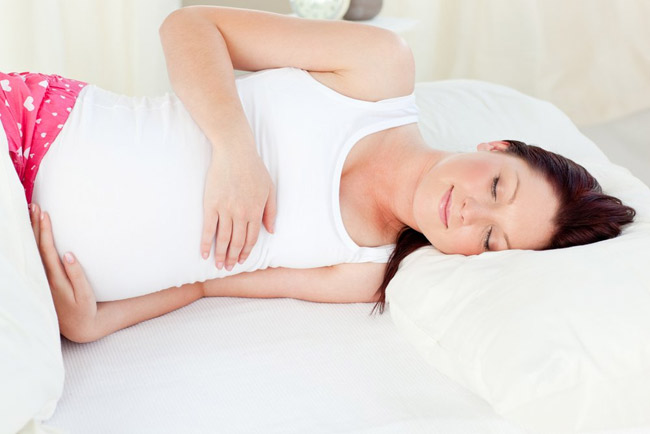Sleeping During Pregnancy

During
pregnancy, inadequate sleep is a common
complain made by women, mostly, due to
the result of anxiety and
stress,
hormonal fluctuations, and
physical
discomfort. As your pregnancy
progresses, you may find it more
difficult to find a comfortable
position, or you may have to get up
several times during the night to empty
your increasingly cramped bladder.
Causes of inadequate sleep
-
Frequent trips to the
bathroom- In early pregnancy and
late pregnancy when the bladder is
compressed by the baby. Especially
during your first trimester, when
the sleep-inducing hormone
progesterone starts surging through
your body, and pressure on your
bladder from your growing uterus
sends you scurrying to the bathroom
countless times every night.
-
Heartburn- Usually occurs
in the second trimester and is
another cause for sleep disturbance.
The uterus pushes up against your
organs causing pressure on the
stomach. At times, stomach acid will
back-flow into the esophagus causing
heartburn.
-
Fetal Movement- Once the
baby starts to kick and move about
(usually around the 5th or 6th
month) you may be awakened by a
particularly feisty fetus.
-
Physical Discomfort- The
bigger you get, the more difficult
the task of finding a comfortable
sleeping position. Your breasts may
be sore in early pregnancy too.
Emotional Worry- Many women feel such anxiety about their child that they lay awake in the wee hours of the morning thinking of all the things that could possibly happen. This is no time to focus on the bad, but the perfect opportunity to practice breathing and relaxation techniques you will need for birth. - Shortness of Breath- Shortness of breath may occur late in pregnancy before the baby has dropped into the pelvis. The uterus and baby are pushing upward into the rib cage making breathing in sitting and lying positions difficult. Again, try lying on your side or propping up your shoulders with pillows.

Tips for a better Sleep
Check out these tips to get a better
and more comfortable night's sleep, and
the critical rest your body and mind
need during this time.
-
Drink plenty of fluids during
the day, but cut down before bedtime
to minimize frequent nighttime
urination.
-
Try lying in a semi upright
position. Check with your doctor
before taking antacids.
-
To prevent heartburn, don't
recline until 1-2 hours after a
meal. If heartburn is a problem,
sleep with your head elevated on
pillows. Also, avoid spicy, acidic
(such as tomato products), or fried
foods as they may worsen symptoms.
Try a glass of milk or a change in
sleeping position.
Try positioning pillows behind your back and between your knees while lying on your side. Also available in some stores are the body pillow and the pregnancy wedge pillow.
-
Exercise regularly for optimum
health, and to improve circulation.
Avoid exercising late in the
day-exercise releases adrenaline
into your body which can keep you
awake at night.
-
Stress and anxiety are key
culprits in preventing a good
night's sleep. Remember that
worrying won't help you, but talking
about your problems will. Find a
friend or a professional who can
listen and help you if there are
issues in your life that are causing
you to worry or feel upset.
-
If you're not getting enough
rest at night, take a nap to help
reduce fatigue. Find a quiet spot,
and relax even if only for a
half-hour nap.
Support your body. Use a special pregnancy body pillow or a regular pillow to support your body. For comfort, try sleeping on your side with one pillow under your knee and another under your belly.
-
Completely eliminate caffeine
and alcohol to prevent insomnia. If
nausea is a problem for you, try
eating frequent bland
snacks (like
crackers) throughout the day.
Keeping your stomach slightly full
helps keep nausea at bay. Eat a
well-balanced diet. Not only is this
crucial for you and your baby's
health, but getting the necessary
nutrients will help keep you feeling
satisfied and less prone to major
nighttime "snack attacks" that may
contribute to restlessness and
insomnia when you go to sleep.
See your doctor for advice if insomnia persists. Now more than ever it's important to get the rest you need!

What's the best sleep position
during pregnancy?
Lying on your left side is actually
good for you and your baby: It improves
the flow of blood and nutrients to the
placenta and it helps your kidneys
efficiently eliminate waste products and
fluids from your body. That, in turn,
reduces swelling in your ankles, feet,
and hands. If you train yourself to
sleep on your left side early on, you'll
have an easier time falling asleep when
your belly is bulging later.
During the second half of pregnancy,
avoid sleeping on your back, a position
that puts the full weight of your uterus
on your spine, back muscles, intestines,
and the inferior vena cava.
Back-sleeping can also put you at risk
for backaches and hemorrhoids,
inefficient digestion, and impaired
breathing and circulation. Lying on your
back in the second and third trimester
can also cause changes in blood
pressure. For some women, it can cause a
drop in blood pressure that can make
them feel dizzy; for others, it can
cause an unwanted
increase in blood
pressure.
